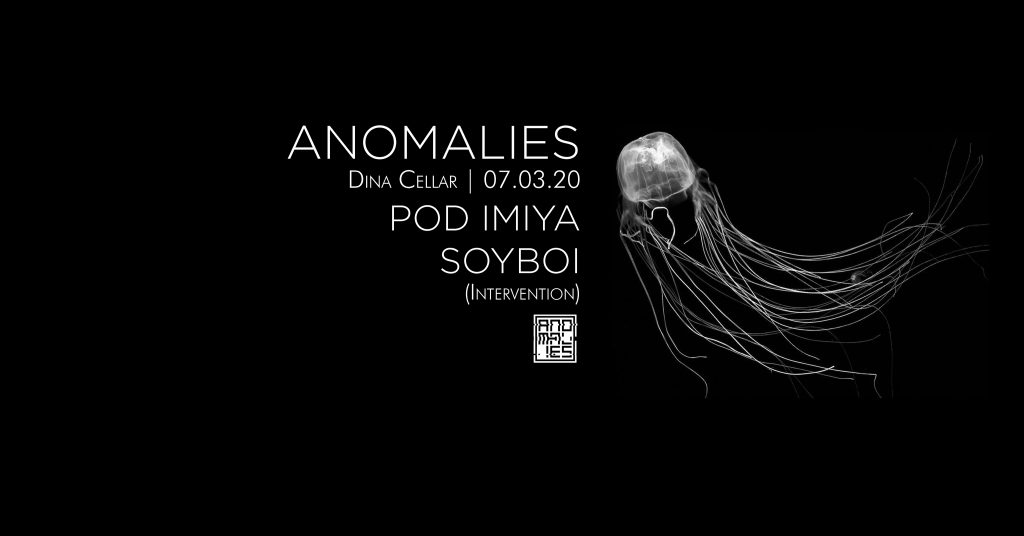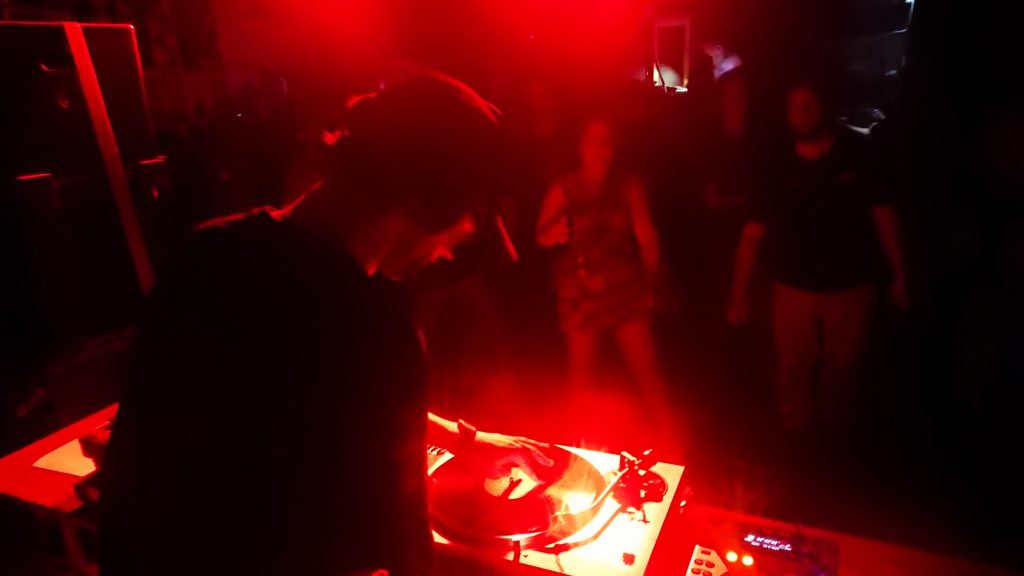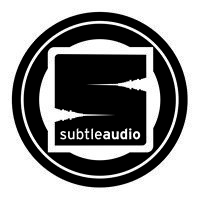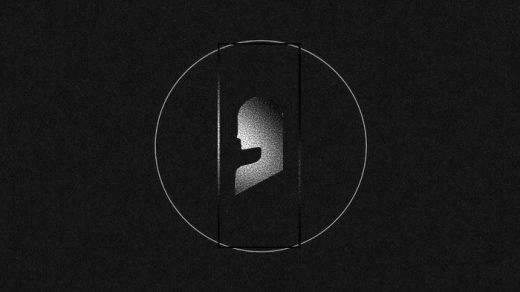Regular readers will remember WYJC’s DJ Parody recommending Anomalies way back in July of last year. Since then I’ve been tracking the Sheffield night and recently caught up with resident DJ Chris Shepherd for this interview.
Tell us about the upcoming gig…
The next Anomalies event is taking place on March 7th, and it’s in the smaller cellar room of a city-centre venue called DINA. I’d recently had to shelve a different night elsewhere due to problems with the venue, so it’s really fortunate that one of my friends has started doing the bookings for this space.
The venue has the perk of being able to start pretty early, so this event is making the most of that with a 6hr selectors-special format. Two of my favourite Manchester DJs – Pod Imiya and Soyboi – and coming down for their first extended sets. Both of these artists have played an Anomalies event before, but they deserve more of a spotlight – and I can’t wait to see what they do with the extra time.

Well, feel free to put the Sonic Nutrition spotlight on them right here…
Pod Imiya is one of those DJs that blows me away every time. She has this really special mixing style where she’ll take the heaviest amen tune you’ve ever heard, and mix it into something really euphoric with loads of pads. It doesn’t feel discontinuous – it feels like a unique expressive voice. Honestly, it blows my mind that she’s not already a mainstream name.
Soyboi on the other hand is a bit of a curveball for Anomalies – in general they play as much footwork and 4/4-kick stuff as they play jungle. But after they smashed it at the last event, I’m now totally on board! Their taste is very future-leaning, and I think 2020 could be a very good year for them as a DJ.
So how did you come across these two names?
Both Soyboi and Pod happen to be two really close friends of mine. We met totally outside of DnB – before I was on that tip – and just clicked as people. Holly (Pod) and I are both PhD students in the same physics department, and Heloise (Soyboi) was a platonic Tinder match. It was really surreal to learn that they’re both such talented DJs – I find that really inspiring.
Looking beyond this upcoming gig, what’s the overall direction for Anomalies?
Anomalies has been running since May last year, and it’s a one-person operation – I organise the event and also DJ under the same name. The concept is pretty simple – I think the darker, harder and deeper sounds of modern DnB are something a lot more people could be into, but these sounds need to be showcased in order to get people on board. Sheffield is an incredible place with a vibrant creative community, and I’m just trying to add to that by filling a niche.
How is Sheffield for putting on a night?
Most of the unique features of Anomalies come from a pretty strong set of constraints. Sheff has a small potential audience, and there’s almost zero pre-existing following for the sounds that I’m trying to push. What’s more, a lot of smaller venues in the city have recently closed at the hands of a council that gives priority to greedy developers – so many promoters have taken their events off the grid and switched to unlicensed spaces. This complicates things a lot, and is only workable because of the good communication and support within the scene.
In short, the night has to be small in scale, with a limited budget and barely any venues available. So the solution is to book artists who are breaking through, and are chomping at the bit to give it everything – and to put the event on in non-standard spaces. For example, the last event was in a friend’s basement record store – and it totally went off! We brought in a serious rig, turned off all the lights, and by 10pm everyone had their head down and was going for it.

I understand that allowing for distinctive sets is an aim of yours…
Anomalies is definitely a quirky night, and the DIY environment has been a really good catalyst for DJs to push themselves and experiment. One recent highlight was having Pixl play a one-off set of freestyle drumfunk – the briefing was “all drums, no amens” – and what ensued was carnage!
In keeping with the experimental focus, most sets at Anomalies are around 2hrs long. In my opinion, DnB has a systemic issue where DJs get forced to play in an overly linear way due to time constraints. With no time to deviate from their standard fare, talented selectors end up playing repetitive sets – and are sold short as a result.
I want to do the opposite, and give the DJ enough time to explore the full range of their musical taste. That way, they have the chance to go totally off-piste and put together something unique – something that the crowd might remember for years to come.
Turning to you, what is your connection to the music?
My personal relationship with the musical style of Anomalies – and electronic music in general, for that matter – is ridiculously short. Until the end of my undergrad, I was deep into a different set of obsessions, namely performance rock climbing and my physics degree. My social scene consisted mostly of upstanding “daytime people”, and there wasn’t much serious musical conversation.
That changed when I got dragged to a free party organised by a crew of deviant Sheffield climbers. At 22, I had the realization that most ravers have before they’re 18 – that there’s this whole world of incredible music and people to explore, and that I wanted to be part of it creatively.
From there how did you get involved in DJing?
After that first revelation, I bought a controller and started trying to figure out what music I actually liked. My entry point was generic 4/4 techno, but pretty soon my housemate got fed up with my shit music and forced me out to a Formless event. That night, it felt like a switch was flicked in my brain – this music was scratching an itch I couldn’t define until now. About 15 minutes into Loxy’s set, I realised that this style of DnB was going to be a big part of my life from now on.
A few days later, I swapped the controller for turntables, bought an armful of records from Eastern Bloc and shut myself off to mix in my room during all my free moments. Eventually, I started bringing these records round friends’ houses – and it turned out that basically none of my DJ mates had anything above 150bpm. It’s so absurd how the DnB scene and the “music scene” are totally different things – and to show everyone what they’re missing, I decided to start a night to showcase modern styles of 170 music.
So, where have you got to now as a DJ?
People usually describe my DJ style as very intense and moody. I’ve always been drawn to creepy and cosmic stuff – which is probably why I now work in cosmology. I’m a very obsessive person, so the sound of me expressing myself will be pretty full-on and meticulous. I like to play DJ sets that set the scene, and then get to the point with some really maximal music – stuff that scratches the aforementioned itch.
To a certain degree, I’m still figuring out how I can put together a really good set – I’ve only mixing DnB for just over a year. However, I’m totally addicted to the learning process – which is probably why I feel more experienced than this time frame would suggest. I’ve been lucky enough to have some great opportunities during this time – sharing a billing with the UVB-76 crew at the White Hotel was a recent highlight on that front.
I love that modern DnB has this huge dynamic range: over a long set, you can go from almost completely ambient through to total rinse-outs. As a DJ, I want to use this range to its utmost and create something really exciting. It seems that I’m starting to deliver on that – I’ve noticed the crowd going for it a lot more during my last few peak-time sets.
One personal quirk is that I’m currently only mixing on vinyl. It’s not a snobbery thing – it just helps me slow down the process of listening to, buying and playing music. That slower pace helps keep me focussed and thoughtful, especially when I was starting out and feeling overwhelmed by the amount of stuff out there. I love organising physical things, chatting to knowledgeable people in record shops, and flicking through cover art.
Right, enough of the words, how about some sounds?
Can do! I’ve recently put out a mix of peak-time selections as part of the Two Hungry Ghosts mix series, and I’m really happy with how it turned out. For anyone who’s curious about what Anomalies is about, this one is a good representation.
While you’re on the Two Hungry Ghosts Soundcloud, it’s worth having a browse if you haven’t done so already – THG is such a good meeting point for traditional and modern styles of 170 music.
Any insider tips from Sheffield for Sonic Nutrition readers?
First and foremost, big up Groundwork! They’re a midweek techno event at Shakespeare’s pub, that also puts on one-off late events – and they’re putting on the best parties with the most interesting bookings in Sheffield by miles. It’s pretty telling that they have so many faithful regulars who show up every month without fail -myself included! They’ve also started a record label, selling out their first EP within a few days. They have much more in the works, so watch this space! Also, Boo Wax – the record shop I mentioned earlier – has a shockingly good second-hand selection of older jungle and modern DnB – recommended without hesitation.
Music aside, my main recommendation for Sheff is to get out of town and into the Peak District. As a counterpart to the relentless partying, the easy access to wild open spaces is such a blessing – to me it’s essential. If you’re around in winter, go for a walk. If it’s summer, there are plenty of wild swimming spots within fifteen minutes drive of the city centre.
Readers of this blog will, no doubt, have more occasion than most to look up at the night sky. Being a cosmologist, is there any particular feature you’d encourage those individuals to look at or think about?
Absolutely! In my opinion, popular science often skims past my favourite feature of modern cosmology – the extreme energy scales of particle physics that formed the large-scale structure of the universe. These scales are far beyond anything we can access with modern particle accelerators, and describe a universe so dense that sound could freely move through it, so hot that stable atoms couldn’t form, so energetic that gravity behaved completely different to it does today. I find that really fun to think about!
What’s more, when we start working beyond the scales of present-day particle physics, cosmology really becomes a study of how little we know. At such unfamiliar scales, a lot of the pieces of our best theories don’t really fit together, and many theorists feel like our current approach is incomplete by construction. This means we’re totally ignorant to the underlying nature of things, and I find that observation to have a very sublime and awe-inspiring quality.
So I’d encourage readers to think about a universe whose true workings are a mystery to us, and feel inspired to wonder what else could be out there over the edge of our understanding.
Continuing the physics theme, is cosmology an inspiration for the name ‘Anomalies’?
Absolutely! I wanted a name that captures DnB’s infatuation with the paranormal, and related that to my own obsessions. In particle physics terms, an anomaly is the breaking of a physical law due to quantum effects – leading to some really freaky behaviour.
We’re almost done but it wouldn’t be a drum ‘n’ bass interview without a suitable opportunity to give a shout out to the crew.
Big up Heloise and Harry, Holly and Sam, Jamie, Elle and the Groundwork crew – I’m so grateful to know you all! Lucie, thanks for putting up with my endless mixing and inane chat. Shout out to Charlie, Alex, Lewis, Tom from Boo Wax, Tasha, the Freeborn Man gremlins, and the extended Sheffield musical family.
When you’re done thinking about the night sky, find out more about Anomalies at the Instagram page and Facebook.



